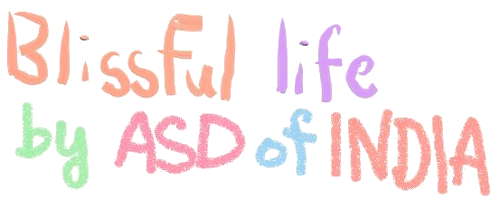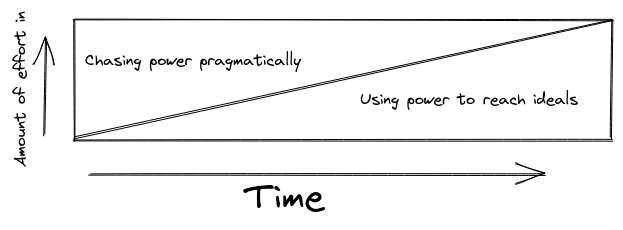You remember how I embraced pragmatism and started chasing power? There was one problem. When you start chasing power with the idea of wielding it for social justice, when and where do you stop chasing power and start wielding it?
Take Praveen's comment for example
One possible answer can be that you start wielding power while you start chasing power - and you chase less and wield more as you go forward.
But going by this, today I should spend lesser effort in chasing power than I spent yesterday. And tomorrow, even lesser than today. That doesn't quite fit with the idea of chasing power first. Perhaps there is a threshold of power which I should reach before I start using power. Perhaps the graph is more like:
Perhaps that threshold is what is called "the line". The line that determines when you stop (or decrease effort in) chasing power and start using that power to reach ideals. Drawing the line becomes important once again.
Let us then try drawing that line.
How much power is enough power? Is a PhD enough academic power? Is a 20 person company that operates in profit enough entrepreneurial power?
Read my poem (?) about career advice. Any goal you accomplish will be dwarfed by a bigger goal. No matter how much power you gain, there will be someone more powerful than you.
Which means that there is no clear way to draw the line on when to stop chasing power.
But there maybe an alternative that requires us to not draw a line. One in which we can chase power and use power simultaneously with the same effort. That alternative requires us to reconcile pragmatism and idealism.
You find a hack to chase power through your ideals.
That is extremely slow though. Slow and excruciatingly boring.
Which is why it has to be extremely personal. You have to be very selfish in what you are doing and craft the journey to your likes and desires. Only that can sustain the boredom of that chase.
(It was Varsha who told me first about entrepreneurship being a very personal journey. This maps on to that. Life is a very personal journey.)
That also solves a long-running question in my mind. How do you find what direction to go in when you are being pragmatic? What's the principle with which you make pragmatic decisions?
The answer is to listen to yourself. To do what feels the most right to you. I know that sounds like profound bullshit (something that internet gurus would say). But it is based on neuroscience and philosophy of knowledge.
The brain is a rather complicated organ. We can process many more signals than we are conscious about. Even when we think we make decisions rationally, we make decisions based on very many things that we haven't consciously considered. Read Scott Young's Unraveling the Enigma of Reason to read more about how our reasons are always post-facto rationalizations.
And this is tied in the external world to intersectionality. There is no decision on earth that lies on a single dimension. Everything affects everything else and nothing is clear-cut.
And thankfully these are complementary. It is only a decision making machine vastly complicated like our brain that can consider all the thousand factors that intersect on a decision in the human world. (I express similar thoughts in the earlier post on living with opposition)
It also means it is difficult to rationalize some of these decisions and generalize them into principles. Pragmatism is the acceptance of this fundamental difficulty and the decision to live within that framework of uncertainty.
Of course, one has to be widely reading and learning to offset the risks of trusting an uninformed brain. One must be open to unlearning and relearning, criticisms, etc as well. These are the things that will protect the pragmatic person from going in the wrong directions.
tl;dr? Trust your gut.



No comments :
Post a Comment
What do you feel?
Note: Only a member of this blog may post a comment.